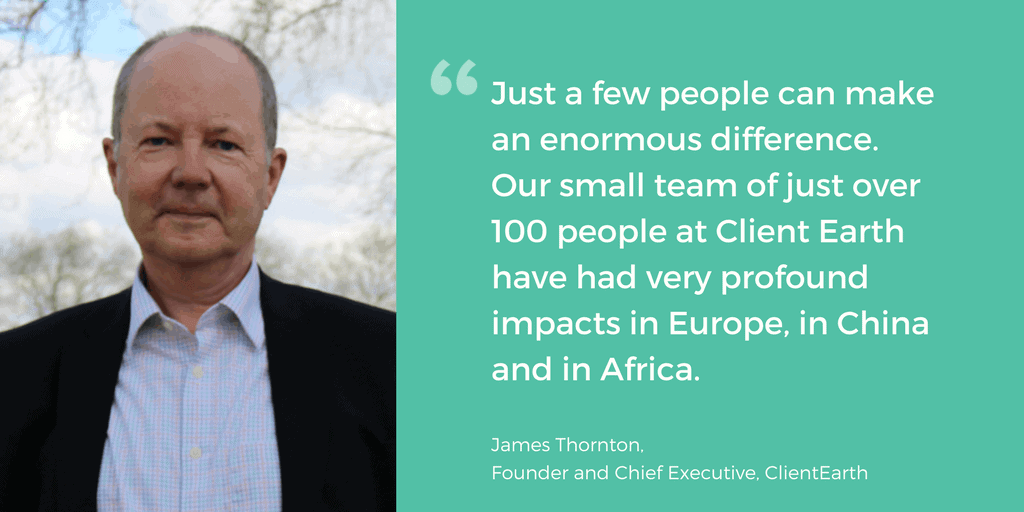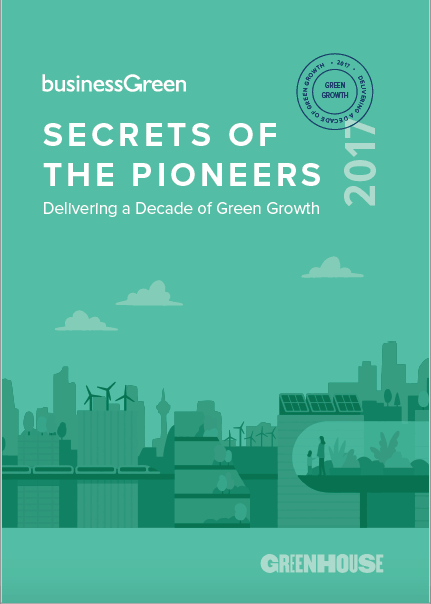Secrets of the Pioneers: James Thornton

We speak to James Thornton, founder and chief executive of ClientEarth, the award-winning environmental law firm which uses advocacy, litigation and research to address environmental challenges, including biodiversity loss, climate change, and chemical pollution.
The interview is part of a series for a report, Secrets of Pioneers, Delivering a Decade of Green Growth, which was launched at the BusinessGreen Leaders’ Summit on 9th November 2017.
James is a successful novelist and a conservation fellow of the Zoological Society of London. In 2012 he was named by The New Statesman as one of ten people who could change the world. In 2016 he was also named BusinessGreen’s Leader of the Year.
Where were you in 2007?
At that point, ClientEarth was just starting up. We were trying to establish that citizens could use law to protect the environment in Europe, because no one had really done that before.
At that time in Europe there was a great interest in the environment and in reducing environmental harm. One of the things we identified was an enforcement deficit in environmental regulations and laws.
One example was that all the capital cities in Europe that we looked at were violating air pollution standards in a fairly extreme way, to the detriment of people’s health. The European Commission was saying that around 400,000 people a year across Europe die early because of air pollution.
So that was an example of a remarkable enforcement deficit. People had agreed air pollution was a very serious matter, they had passed quite decent legislation in Brussels which then was passed in every country, and then not much was done to apply it.
One of the other dynamics was NGOs had become very expert at campaigning and at policy, but they didn’t use law very much and because of that they didn’t try and enforce law very much. So countries and the EU itself were rather lackadaisical about ensuring compliance with the law.
Where are we now with tackling that deficit?
A number of things have changed in the last 10 years. One of the most dramatic developments is that everyone understands environmental problems are much more serious than we thought even 10 years ago.
We have the Paris Agreement, which is in my mind a turning point in human history. Basically all the countries in the world have agreed climate change is so significant they are willing to take serious measures. That’s enormously important. We have also understood biodiversity loss is happening much more rapidly than we knew 10 years ago. Astoundingly, something like 50 per cent of all wild animals have been eliminated in the last 40 years.
In me there is enormous hope, because once you understand things you can start to solve problems. For example, there is a lot more citizen involvement in enforcement.
We started air quality cases in the UK, and we beat the government in the Supreme Court. I had discussions with Michael Gove yesterday about air quality, I hope the UK will now make dramatic moves to clean it up.
We have also brought cases all across Europe. We have won a series of cases in Germany for example and Poland, and we will see results. We will see countries now having to deliver on the promises they made, because citizens are demanding it.
China has also changed a lot in the last 10 years. Napoleon said: “China is a giant who is sleeping, and let her sleep because when she wakes she will change the world.” And he was
a smart fellow – it has woken up on the environment.
So while the Western companies who are clever about this will be ahead of companies pushing old industries, the real competition I think for Western green companies may be coming from China. They will have to keep a careful eye on that.
What is the most important lesson you have learned over the last decade?
That a few people can make an enormous difference. We have had very profound impacts in Europe, in China and in Africa, and we are still only a little more than 100 people at Client Earth. And that impact comes from being strategic, having powerful tools, and having a vision of where we want to go.

What’s your vision for the green economy in 2027?
The world’s biggest problems from an environmental perspective are climate change and biodiversity loss.
My hopes for the next 10 years are that we will see a thorough move towards addressing climate change. I believe there is still time to do it. If industry and the market really get behind faster electrification of the transport fleet, electrification of the economy, and generating the electricity needed in a zero-carbon way, then we have tremendous potential to keep climate change within the Paris Agreement target. Even 1.5C is possible.
And second is biodiversity loss. The good news is even though we have killed 90 per cent of the sharks in the ocean, 10 per cent are still there. So all we have to do is treat them with respect and the biodiversity loss can be stabilised and we can come back.
What will be the biggest changes on the ground?
Well one that’s obvious to visualise is people will drive fully electric vehicles and the electricity for that will come from only renewable sources. If that happened, your contribution to climate change will plummet and the health of your children will soar. That’s one change I think is very tangible and reasonable to expect.
Do you think we will be on course for two degrees?
Yes, well we have to be. And I believe we certainly can be. The reason I am generating hope for it is because hope is my job. Unless you have a positive vision of where you want to go you will never get there.
If you could invest in one technology over the next decade, which would it be and why?
That’s an interesting question. I would say there would be two: clean tech in terms of electricity generation, and Artifical Intelligence (AI).
I think one of the ways the industry is going to help us move much more quickly than we anticipate to a carbon-neutral economy is through development of AI. That needs to be done in the right way, in such a way that it benefits people and the environment. But it could potentially be an enormous help in making sure we achieve these objectives.
If you had to give some advice to somebody starting out in the industry today what would you say?
I would say the future is carbon neutral. So find a way to contribute something that nobody else is, and contribute something that AI won’t be able to do instead of you in 10 years.

This interview is one of more than 20 which make up a report, Secrets of the Pioneers: Delivering a Decade of Green Growth, published on 9th November at the BusinessGreen Leaders’ Summit.
We have already featured interviews with many other leaders from the sector, including Christiana Figueres, former executive secretary of the United Nations Framework Convention on Climate Change, Mike Barry, director of sustainable business at Marks & Spencer, and climate scientist Dr Emily Shuckburgh. These interviews and many others are available on the blog.
This year marks the 10th anniversary of both BusinessGreen and Greenhouse PR, the specialist communications agency which supports businesses, entrepreneurs and campaigners working to create a green economy.
At Greenhouse, we support a wide variety of organisations pioneering new standards of sustainability across multiple sectors. Whether it’s fashion, finance or farming, we’re always on the look-out for new opportunities to reach our clients’ target audiences. If you’ve got a great story and need our help to tell it, we’d love to hear from you.


